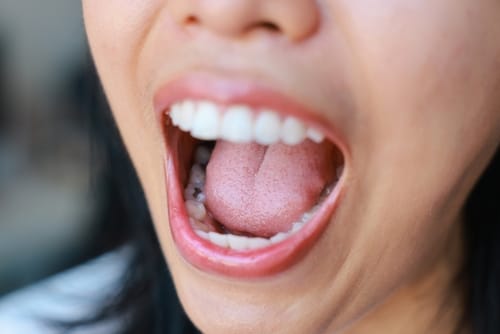Gum disease, or periodontal disease, is an infection that harms the tissues that support your teeth. It’s a common problem, but many people initially do not notice it. The issue begins when plaque builds up along the gum line.
If you do not treat gum disease, it can get worse over time. This may damage the gum tissue and bones that keep your teeth in place. Eventually, this can cause loose teeth, pain, and even tooth loss.
What is Gum Disease?
Gum disease, or periodontal disease, is caused by bacteria buildup in the mouth leading to inflammation. In the gingivitis stage, gums appear red and swollen and bleed easily. Untreated, it progresses to periodontitis, where gums move from teeth, causing infections and damage to bone and tissue.
Causes and Risk Factors of Gum Disease
Gum disease is mainly caused by plaque, a bacterial film on teeth. Using tobacco products like cigarettes increases the risk by weakening the immune system and promoting calculus buildup, which leads to gum irritation. Hormonal changes and certain illnesses can also raise the risk. A family history of gum disease and poor oral hygiene plays a role, too.
Symptoms to Watch For
Gum disease can manifest subtly, making early detection crucial. Watch for persistent bad breath or a bad taste, bleeding gums during brushing, which indicates gingivitis, and gum inflammation caused by plaque bacteria. Look out for soft, swollen, or red gums, gum recession, loose teeth, changes in bite, or ill-fitting dentures.
The Importance of Oral Hygiene
Good oral hygiene is crucial for a healthy mouth and fighting gum disease. Brushing alone isn’t sufficient; regular cleaning of the mouth is essential to prevent plaque buildup. Flossing removes food particles and plaque between teeth, while mouthwash kills germs. Regular dental checkups are also necessary for proper oral hygiene.
How Oral Health Affects Overall Well-being
Oral health is crucial for overall well-being. Research worldwide shows that it impacts various health issues. Gum disease-causing bacteria can affect other body parts through the bloodstream, increasing risks of heart disease, stroke, diabetes, lung disease, and pregnancy complications. Maintaining good oral health involves brushing with fluoride toothpaste twice daily, flossing, eating a balanced diet, and regular dental check-ups to benefit your entire body.
Preventing Gum Disease Through Oral Hygiene
To prevent gum disease, brush your teeth twice daily with fluoride toothpaste to strengthen enamel and prevent decay. Clean between teeth daily with floss to remove plaque, especially near the gumline. Using antimicrobial mouthwash can provide extra protection against harmful bacteria and reduce plaque buildup to prevent inflammation.
Daily Oral Care Techniques
Taking care of your mouth is crucial for oral health and preventing gum disease. In addition to using a good toothbrush, incorporating tools like water flossers or interdental brushes can enhance your oral hygiene routine. Consult your dentist for personalized advice on cleaning methods for dental work areas.
Proper Brushing Methods
Brushing your teeth correctly is crucial for gum and enamel health. Hold the brush at a 45-degree angle towards the gums and use gentle strokes on all tooth surfaces, including the tongue. Change your toothbrush every 3-4 months or sooner if the bristles are worn. Opt for a soft-bristled brush and fluoride toothpaste with the ADA Seal of Acceptance for safety and effectiveness.
Flossing: Why It’s Essential
Brushing cleans the front, back, and chewing surfaces of your teeth but can’t reach tight spaces. Dental floss is essential for removing plaque and preventing gum disease. Floss daily to remove food particles and plaque. Plaque buildup can harden into tartar over time, requiring professional removal. Slide floss gently between teeth and curve around each tooth base to maintain healthy gums.
The Role of Mouthwash in Gum Disease Prevention
Mouthwash is a helpful addition to daily oral hygiene but not a substitute for brushing and flossing. It freshens breath, prevents gum disease, and kills bacteria to reduce plaque, gingivitis, and bad breath. Some mouthwashes contain fluoride, which strengthens tooth enamel and fights decay. Choose a mouthwash with the ADA Seal of Acceptance for safety and effectiveness.
Professional Dental Care
Professional dental care is crucial for maintaining oral health. Regular checkups help detect issues early, like gum disease, preventing tooth loss or gum recession. Dental professionals clean your teeth thoroughly, provide oral hygiene tips, and offer tailored treatments for optimal oral health.
The Importance of Regular Dental Checkups
According to the American Dental Association (ADA), regular dental checkups are crucial for good oral health. These visits help detect issues early and prevent them. Dentists can identify gum disease before symptoms appear through physical exams and X-rays. Early detection aids in effective treatment and prevents further damage. The ADA recommends visiting your dentist every six months or more frequently based on individual needs.
Deep Cleaning Procedures to Prevent Gum Disease
Deep cleaning prevents or treats gum disease by removing tartar and bacteria below the gum line, promoting gum health. Scaling removes plaque and tartar, while root planing smoothens tooth roots to discourage bacterial adhesion. These procedures eliminate bacteria and toxins causing inflammation and gum disease, allowing gums to heal and reattach to teeth.
Diet and Lifestyle Changes for Healthy Gums
To maintain healthy gums, focus on more than just dental care. A diet rich in fruits, vegetables, and healthy foods provides essential nutrients. Quitting smoking and reducing alcohol intake can lower the risk of gum disease, benefiting both oral and overall health.
Foods to Eat and Avoid for Gum Health
A balanced diet is crucial for overall and gum health. Foods rich in Vitamin C, such as citrus fruits and bell peppers, help produce collagen for strong gums. Calcium-rich foods like milk and cheese strengthen teeth and bones, benefiting gums too. Crunchy fruits like apples naturally clean your mouth by increasing saliva flow to wash away food particles and plaque. However, sugary foods fuel bacteria in plaque, increasing the risk of cavities and gum disease. Acidic foods like sodas erode tooth enamel, weakening teeth and impacting gum health. Limiting sugar and acidic foods improves gum health.
Smoking and Its Impact on Gum Disease
Smoking harms oral health, increasing the risk of gum disease by weakening the immune system. This makes it harder for the body to fight infections, including gum infections. Smoking can mask early signs of gum disease, like bleeding gums, by reducing blood flow. Quitting smoking is crucial for gum health and lowers the risk of periodontal disease. Seek help from healthcare professionals or stop-smoking programs for support in quitting.
Schedule a Check Up
The specialists at Creekside Family Dental can detect early signs of gum disease and give your teeth a thorough cleaning. Schedule an appointment today to prioritize your dental hygiene.
 Meet Dr. Leffler
Meet Dr. Leffler
 Meet the Team
Meet the Team
 Dental Membership Plan
Dental Membership Plan
 Insurance Information
Insurance Information
 Patient Forms
Patient Forms
 Online Bill Pay
Online Bill Pay
 Your First Visit
Your First Visit





